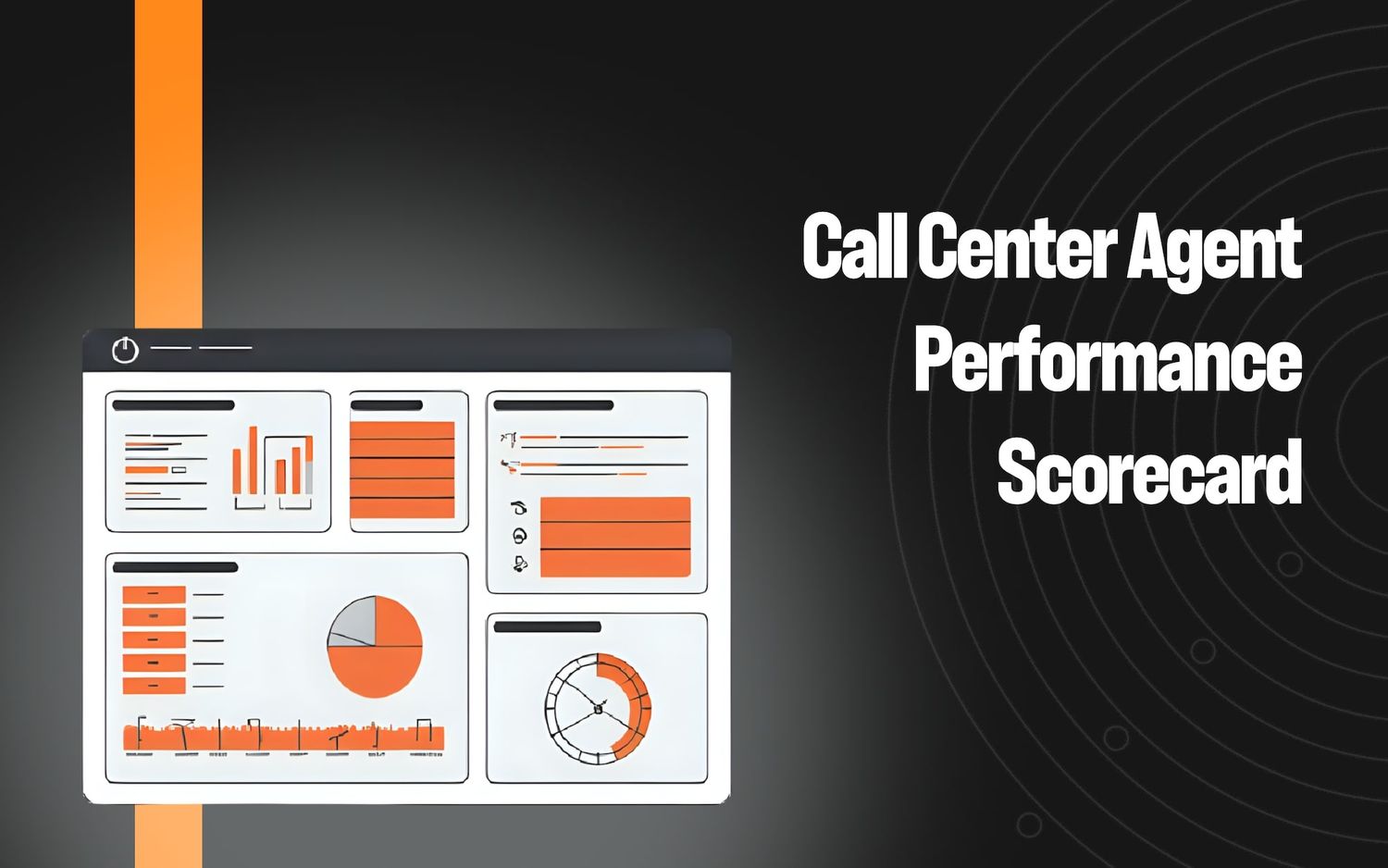Top 10 AI Tools for Customer Service (By Use Case)

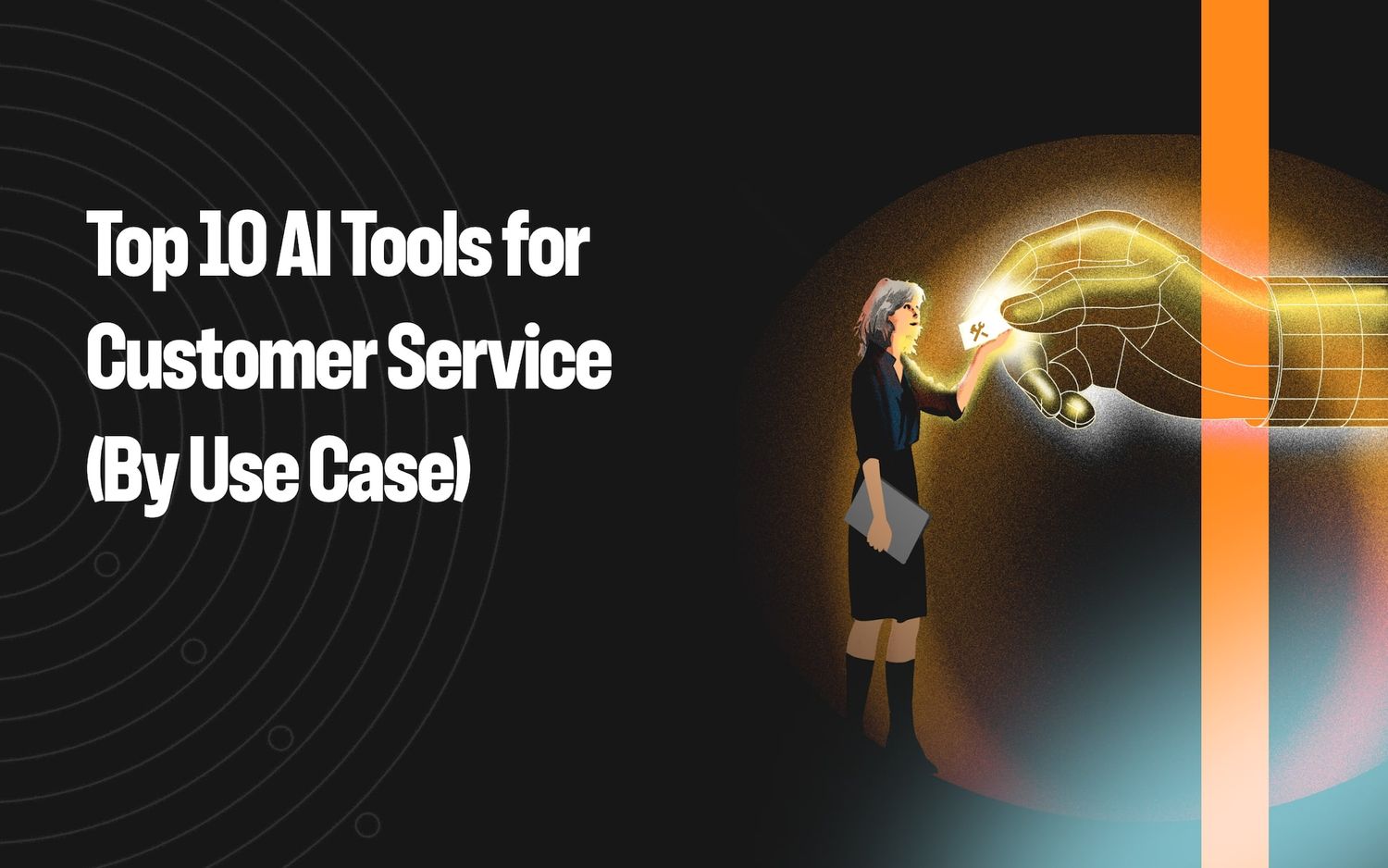
AI is changing customer service by allowing businesses to:
- Automate manual or repetitive tasks, such as ticket routing, post-call note taking, customer service announcements, or handling simple customer inquiries via AI-powered chatbots.
- Support agents during calls by providing them with real-time conversational assistance.
- Provide managers with coaching tools and live analytics to oversee the service center.
- Equip QA teams with intelligent reporting and Voice of the Customer (VoC) tools.
While it does a lot to improve customer service, finding the right AI tool isn’t necessarily easy.
That’s why, in this article, we show you 10 different solutions for:
We kick off the first use case with an in-depth review of Level AI, our customer experience platform that enables organizations to scale their QA.
Directly below, we also discuss what to look for in an AI tool.
How to Know If an AI Tool Will Produce Accurate Results
There are two main factors to consider when evaluating vendor tools:
- Does the solution let you train its AI to improve accuracy over time?
- Does the solution claim to use AI, but actually relies on rules-based algorithms instead?
AI systems are trained to achieve a certain level of accuracy (in Level AI’s case, near-human accuracy) but aren’t infallible.
They also need to be continuously updated with new information reflecting changing business needs and shifting customer expectations.
Look for tools that let users give feedback, like marking answers as right or wrong, to help the AI improve. Simple UI features can make this easy, like up- or downvoting the relevance and accuracy of content, or having the ability to add in your own information.
While the ability to train the AI over time is critical, it’s equally important to know if the tool you’re evaluating claims to use AI or is simply a rules-based system in disguise.
One way to tell is if the system relies on keywords rather than natural language understanding (NLU) to understand intent.
A typical example of this might be a tool configured to recognize mentions of the word “cancel,” allowing it to correctly detect the underlying intent of customer phrases like “I need to cancel my order” or “I don’t want to cancel,” but not necessarily statements like “Can you stop the order?” or “I changed my mind about the purchase.”
Such systems require you to enter multiple combinations of keywords to ensure the capture of as many instances of a single intent as possible, but even then you’re not guaranteed to capture every instance, as the system is matching patterns, yet not understanding the underlying meanings and context of what’s being discussed.
Below, we describe how platforms incorporating AI effectively detect customer intent, which opens the door to real understanding of context and automation of customer service.
AI Tools for Call Centers
Level AI: Advanced AI for Contact Centers
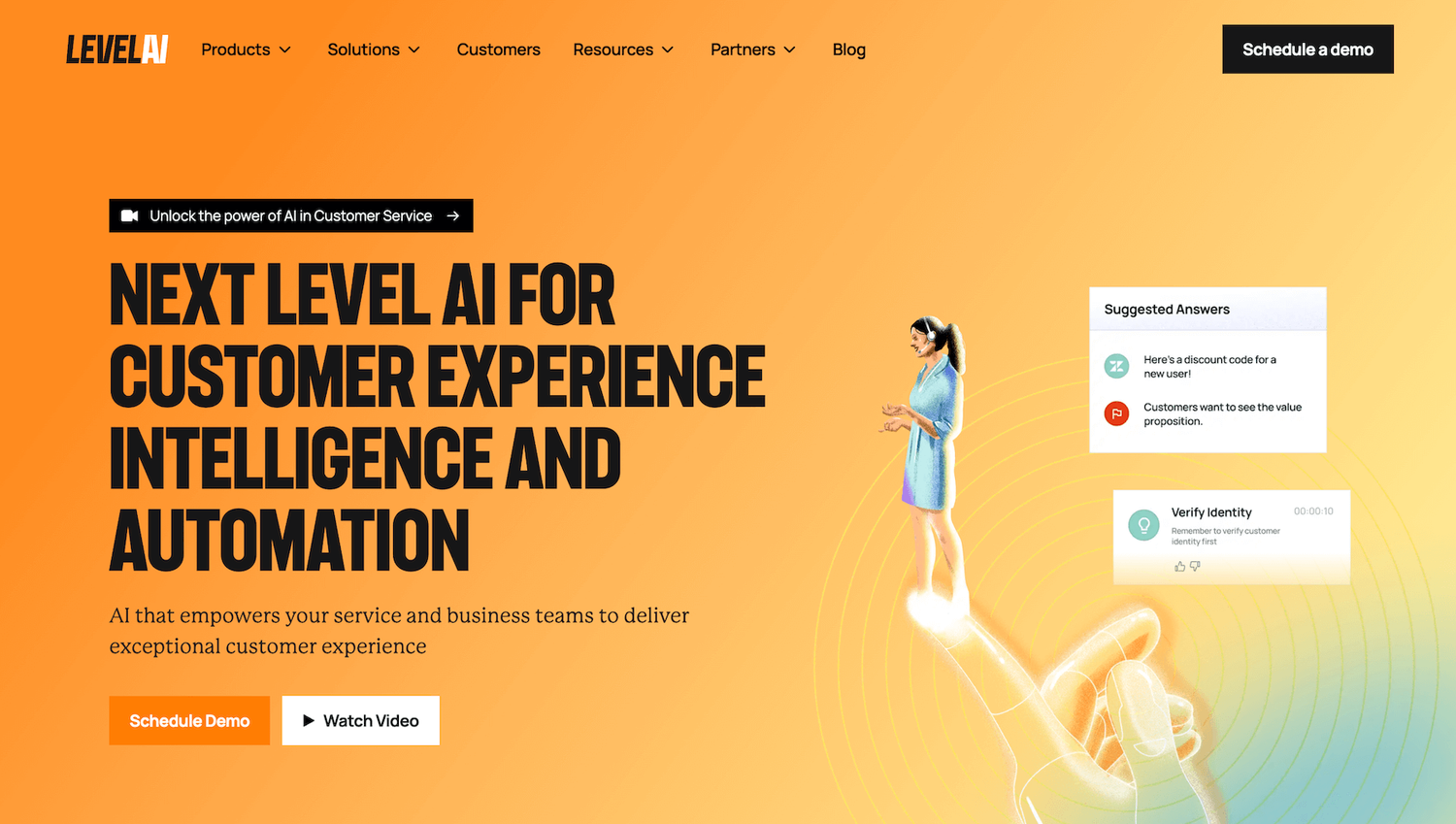
Level AI’s secure and customizable Generative AI capabilities incorporate both NLU, a component of natural language processing, and semantic intelligence, leveraging conversational intelligence to analyze and understand intent and sentiment expressed during customer calls.
This helps organizations improve quality assurance, coaching, and customer satisfaction by scaling insights from 100% of interactions — which is otherwise unachievable manually.
Reading Underlying Meanings and Detecting Sentiments
Our platform automatically extracts underlying meanings and classifies them in interesting and meaningful ways without human involvement.
This saves QA teams time and effort as they’re generally able to review only 1–2% of calls in a busy contact center. And, human evaluations still might contain inaccuracies and biases.
Level AI’s Scenario Engine analyzes conversations and recognizes instances of customer intent, classifying these as scenarios.
Examples of scenarios are:
- Installation Assistance
- Refund Inquiry
- Cross-Sell Suggestion
- Branding
For instance, when the Scenario Engine encounters a phrase like “I thought you were about luxury but your prices seem cheap,” it might classify this as a “Branding” scenario (depending on how your system is set up), assigning the phrase a conversation tag (which denotes the scenario) in the call transcript.
Any given interaction might contain multiple such conversation tags, which you can later search and filter to display all conversations where a customer requested installation assistance, for example.
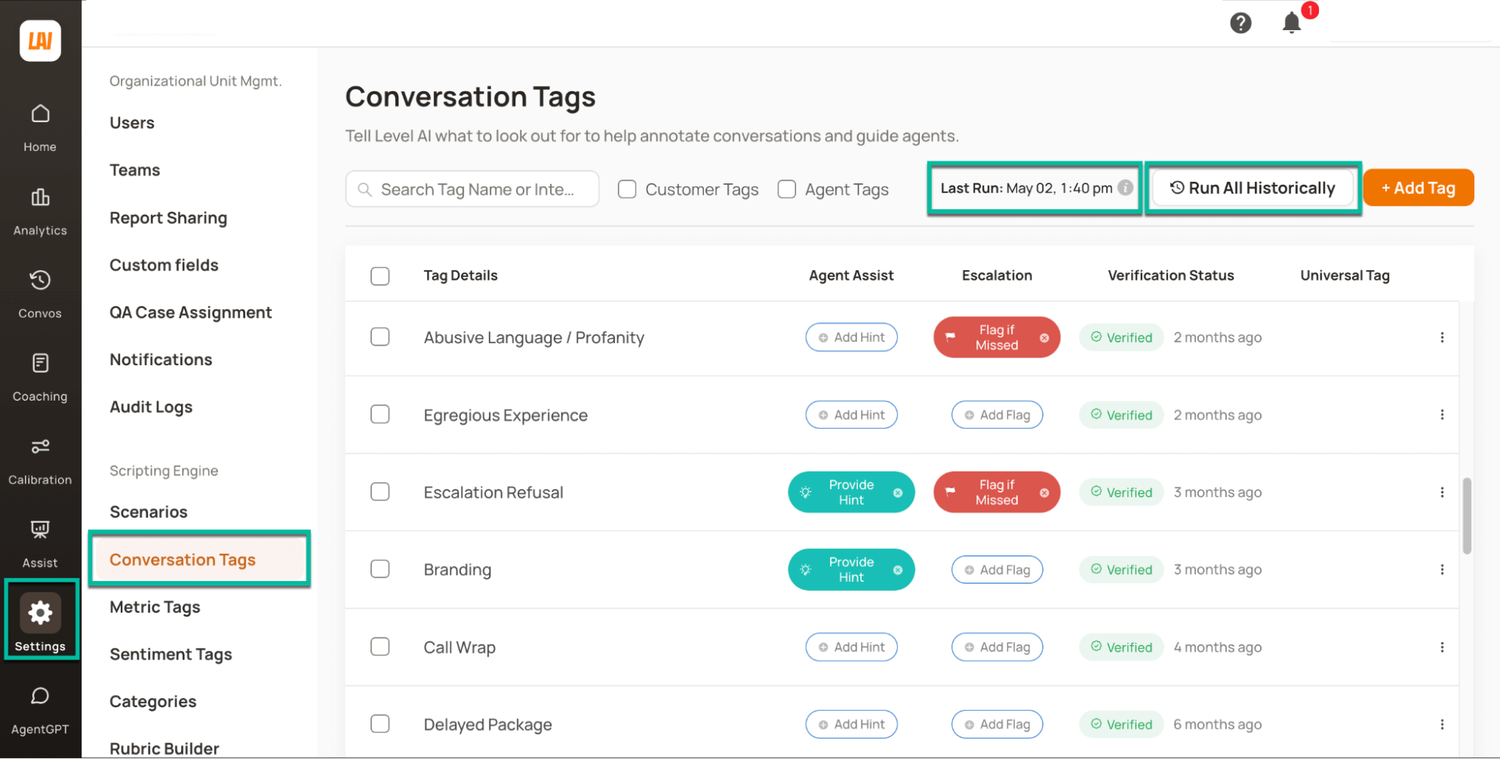
Level AI’s capability to automatically detect meanings and intents expressed in conversations allows it to identify instances of customer sentiment.
The platform can detect the widest range of sentiments of any software in the industry:
- Anger
- Disapproval
- Disappointment
- Worry
- Happiness
- Admiration
- Gratitude
This goes beyond rules-based algorithms that simply use a binary classification of “positive” or “negative,” and instead gives businesses a more fine-grained understanding of emotions.
Whenever a customer expresses an emotion, the platform indicates this using a sentiment tag (denoting one of the emotions above), which you can filter and search. For example, you can find conversations where someone expressed gratitude.
Level AI also scores the overall sentiment of a conversation by calculating a unique Sentiment Score, which is on a scale from 0 to 10, with 0 being extremely negative and 10 being extremely positive.
This lets you correlate trends in customer sentiment against other variables like product experience, agent performance, or operational metrics like response time, first call resolution, and call transfer rate.
The platform calculates Sentiment Score by appropriately weighting the timing of expressed sentiments throughout a conversation, with those occurring towards the end of a conversation carrying greater weight than those prior.
This is to take into account the lasting impression that a resolution (or non-resolution) leaves on a customer.

Supporting Call Center Agents
Level AI’s deep understanding of human language lets it support call center agents by:
- Displaying relevant topics and suggestions during live calls for efficient handling (Real-Time Agent Assist)
- Automatically categorizing calls for automatic dispositioning (Auto-Categorization)
We go into detail on both these features below.
Real-Time Agent Assist
This feature helps agents to resolve issues faster and to provide higher-quality interactions by displaying cards for FAQ items, suggestions, recommended responses, and other relevant information that are directly relevant to the topic under discussion, pulling the information from your connected knowledge base.
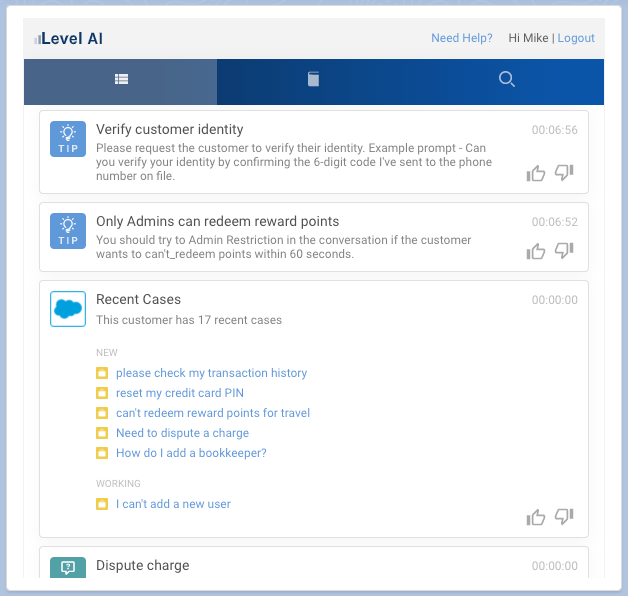
To ensure accurate, up-to-date information, Real-Time Agent Assist:
- Links to sources so agents can easily and quickly verify the information if needed.
- Provides a voting feature for every card shown, consisting of thumbs-up and -down buttons so agents can indicate the accuracy and relevance of the information.
Real-Time Agent Assist’s search feature uses AgentGPT, an AI chat system that speeds up searching by both auto-filling the search bar with proposed topics and displaying information relevant to those topics.
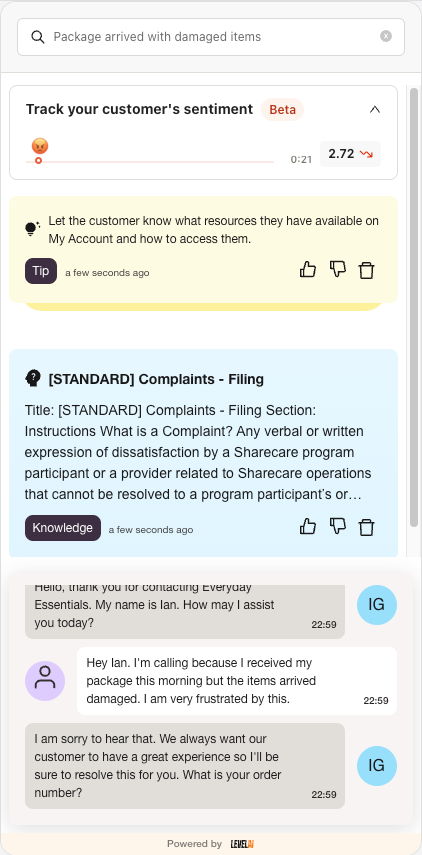
Just as with Real-Time Agent Assist, AgentGPT can be trained by up- or downvoting search results.
The feature improves agent efficiency by letting them answer queries faster and helping avoid situations that leave customers feeling dissatisfied for being put on hold.
On the agent’s side, this can reduce the stress of having to make customers wait while they search for answers.
It reduces time to resolution and can improve the customer experience, as one of our customers achieved a 13% decrease in overall call handling time.
Another advantage is it helps onboard new agents more efficiently as it gives them “training wheels” as they start solving customer issues.
Auto-Categorization
Level AI automatically categorizes calls for dispositioning purposes so that agents don’t have to do this as part of post-call tasks.
The system assigns both a category and subcategory to each completed call according to your configured taxonomy, without the agent needing to manually look these up.
This not only saves time and effort, but is generally more accurate and consistent than when agents do this themselves, especially after conversations where they may be feeling tired and distracted.
Level AI comes with predefined categories, but you can also add specific ones for your business’ needs by providing example phrases:
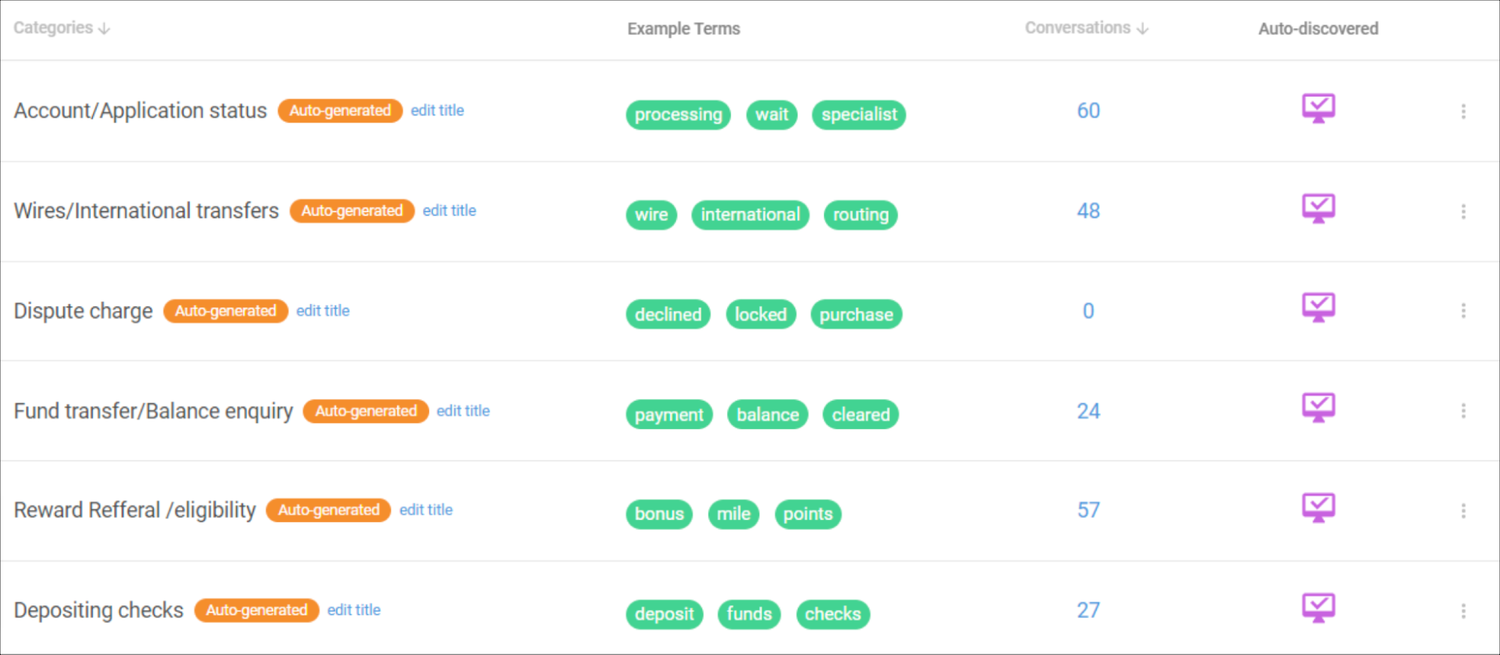
During this process, the system presents both exact-match and near-miss phrases from past conversations for you to accept or reject to train the model.
Supporting Call Center Managers with Call Monitoring
Real-Time Manager Assist provides supervisors with situational awareness of live calls across the contact center to proactively support agents and thereby ensure better outcomes.
The platform offers feature-rich dashboards that highlight key metrics, sentiment trends, and agent performance in real-time, and gives managers the tools to monitor calls and effectively intervene if necessary by starting a coaching session with one click:
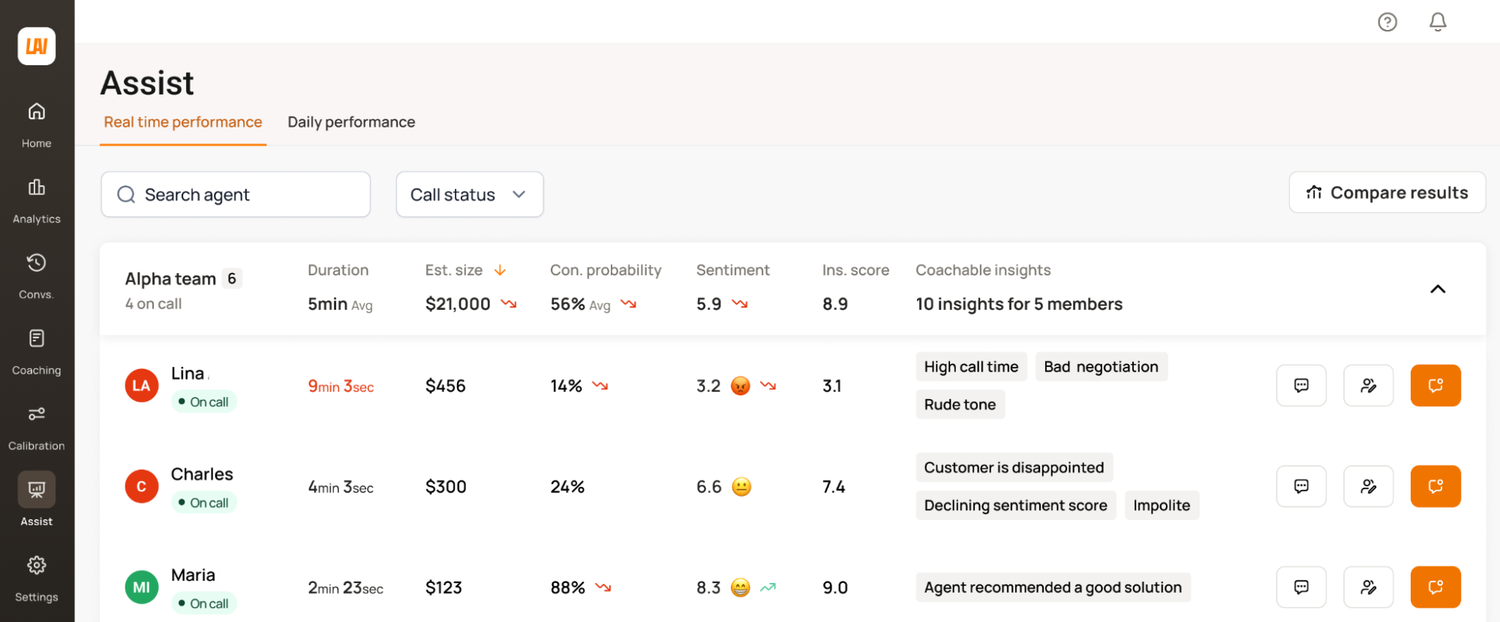
The dashboard shows the following stats for every call in progress:
- Agent name
- Call duration
- Conversation probability and estimated deal size
- Conversation Sentiment Score
- Agent InstaScore (described in the next section)
- Coachable Insights, like when a call has a higher-than-average duration or the customer is showing disappointment
The software also offers call whispering and barging capabilities for on-the-spot coaching or escalation.
Such detailed metrics give managers key insights into the call before they intervene, reducing the amount of context they need agents to give them.
Auto-Scoring Agent Performance
Level AI’s InstaScore gives you an at-a-glance reading of how well an agent is performing against your organization’s rubrics, for example:
- Using the customer’s name in conversations
- Following company procedure to resolve issues
- Expressing empathy towards the customer
- Explicitly clarifying the customer’s concerns
Agent InstaScore is expressed as a percentage and is shown for every interaction registered in our system, both in real-time and in the past, allowing you to efficiently sample conversations for following up, e.g., to find coaching opportunities or to identify patterns of consistent under- or overperformance.
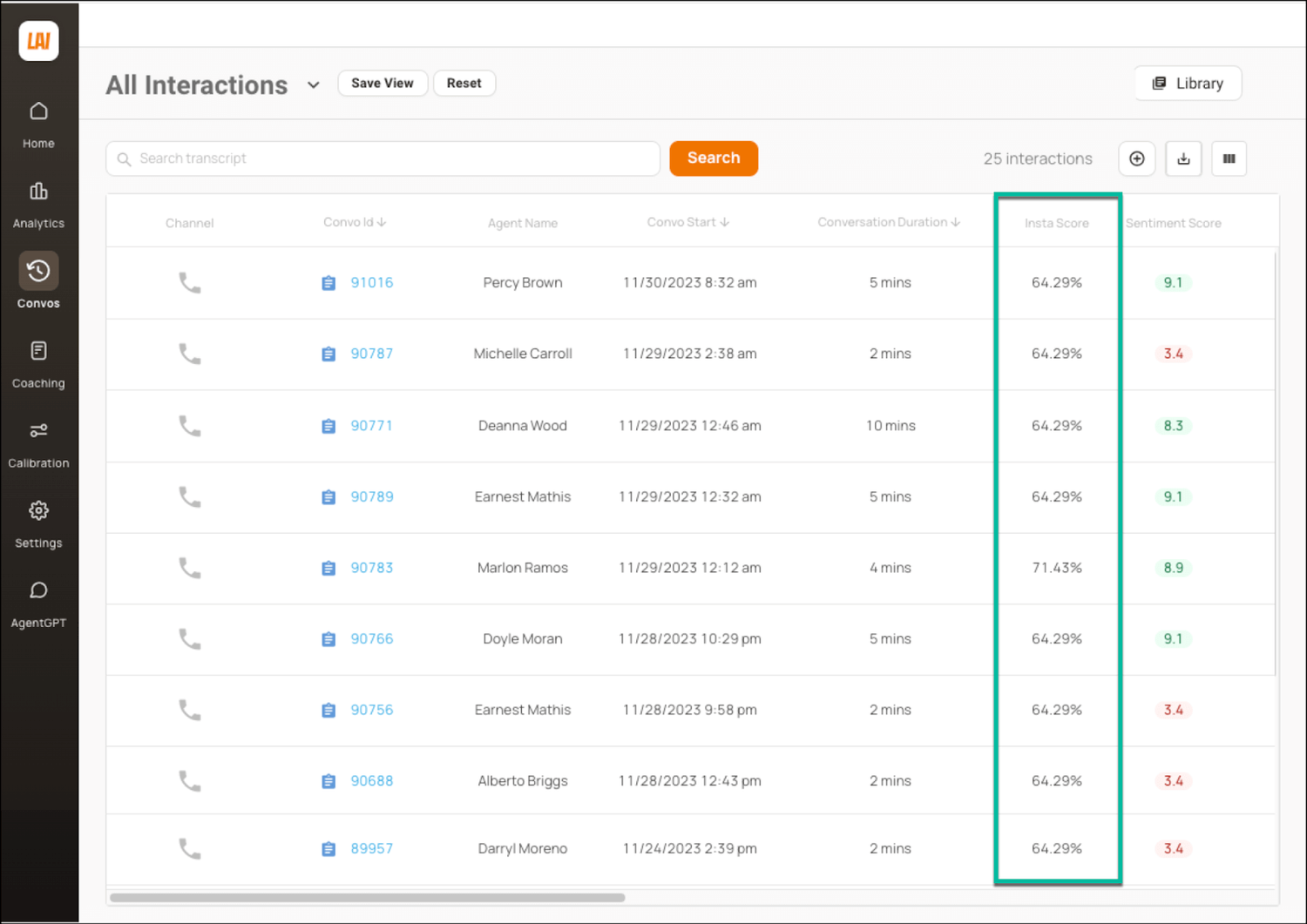
(You can also share Level AI dashboards showing stats like InstaScore with agents, providing them ways to take ownership of their own professional development.)
Automating Call Reviews at Scale
Another way to efficiently sample conversations is using InstaReview, an indicator identifying conversations having certain characteristics that might require your attention.
For example, InstaReview flags a conversation with a high number of assists as rich, or with a Sentiment Score of less than six as negative.
The system uses multi-colored tags to to give you an at-a-glance indication that a particular conversation is worth digging into:
- Rich conversation
- Positive conversation
- Negative conversation

Understanding Customers Through VoC Data & Reporting
Level AI’s Voice of the Customer (VoC) Insights derives and tracks not only traditional metrics like CSAT and NPS, but also more subtle patterns in sentiment, feedback, and behavior across customer interactions — all without needing to send out surveys.
Such stats and patterns come from our system’s AI speech analytics and ability to identify expressed intent and emotions. This enables an automated, survey-free approach to gathering and analyzing VoC data, providing actionable insights effortlessly.
Such insights are presented using intuitive dashboards that provide an overview of the most important trends happening at the moment:
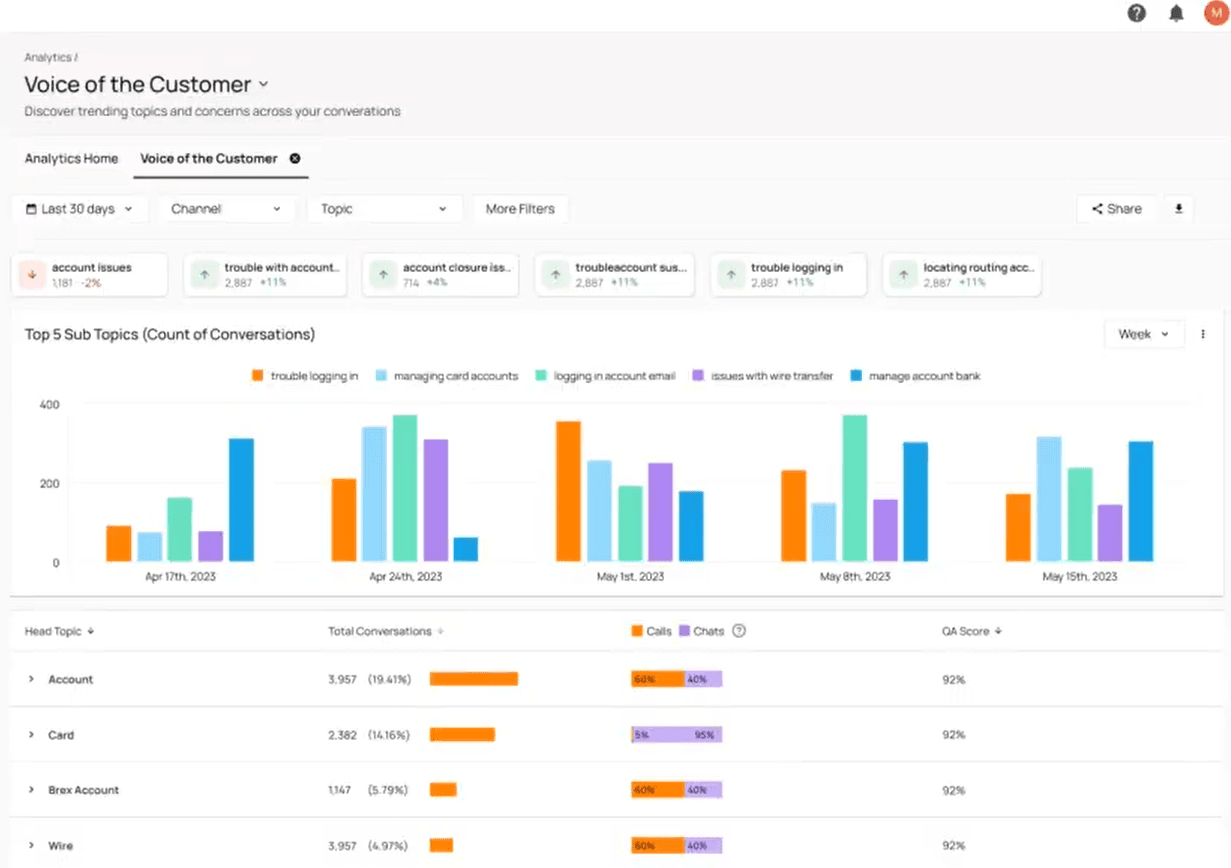
Our “Top 5 Topics” dashboard shows the five most common issues your customers are having, as well as how different metrics around these issues have evolved over time (e.g., number of conversations around them, resolution rates, etc.):
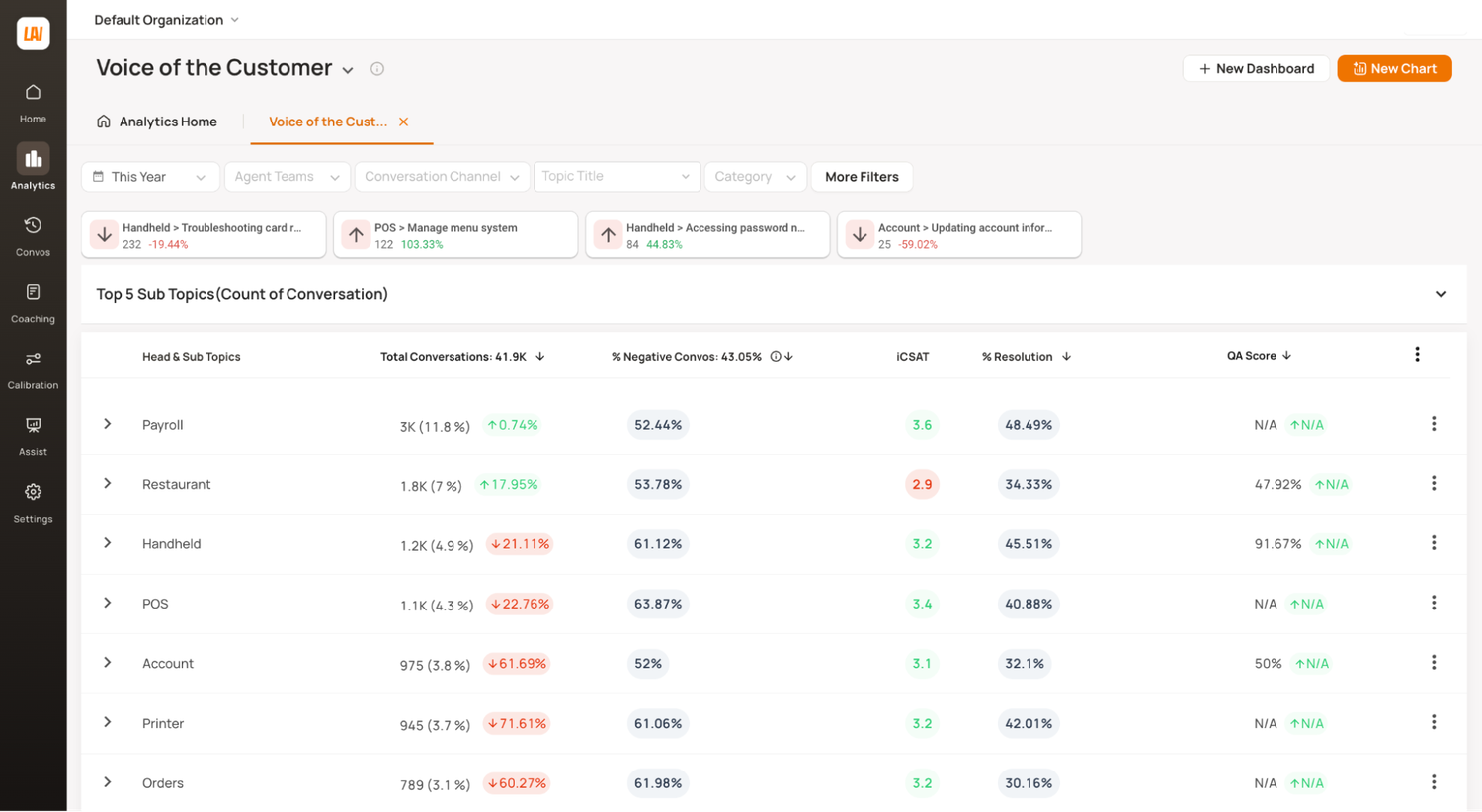
A key aspect of this data is that it can reveal trends so subtle you might not have noticed them otherwise.
For example, VoC Insights might detect a growing frustration among customers regarding delays in order confirmation emails — something that hasn’t yet escalated to outright complaints but could soon impact customer satisfaction if left unaddressed.
One of Level AI’s customers, a buy-now-pay-later provider, used VoC Insights data to identify customer priorities and concerns that their self-service chatbot wasn’t addressing.
After adding the newer queries and concerns to the chatbot’s repertoire, the company experienced only a 6% rise in support call volume compared with the expected 150% during both Black Friday and Cyber Monday, saving the company an estimated $2 million.
Teams can also further explore emerging issues and find opportunities to improve customer experience with Level AI’s Reporting and Analytics.
As a part of the platform’s analytics functionality, Query Builder lets you create custom reports based on Level AI elements such as sentiment and conversation tags, as well as external data from other tools in your organization, like CRMs, ticketing solutions, and more.
This gives you a holistic view of how customers are experiencing your services and brand, and allows you to answer interesting questions such as:
- What are the main reasons for customer churn?
- Did recent changes in customer service protocols lead to better CSAT scores?
- Are there specific types of issues that result in repeat calls?
- Which strategies helped agents reverse negative customer sentiment during a call and successfully resolve an issue?
Query Builder lets you build charts and specify a wide variety of parameters allowing you to dig into the data and uncover valuable patterns and data tailored to your customers and business needs:
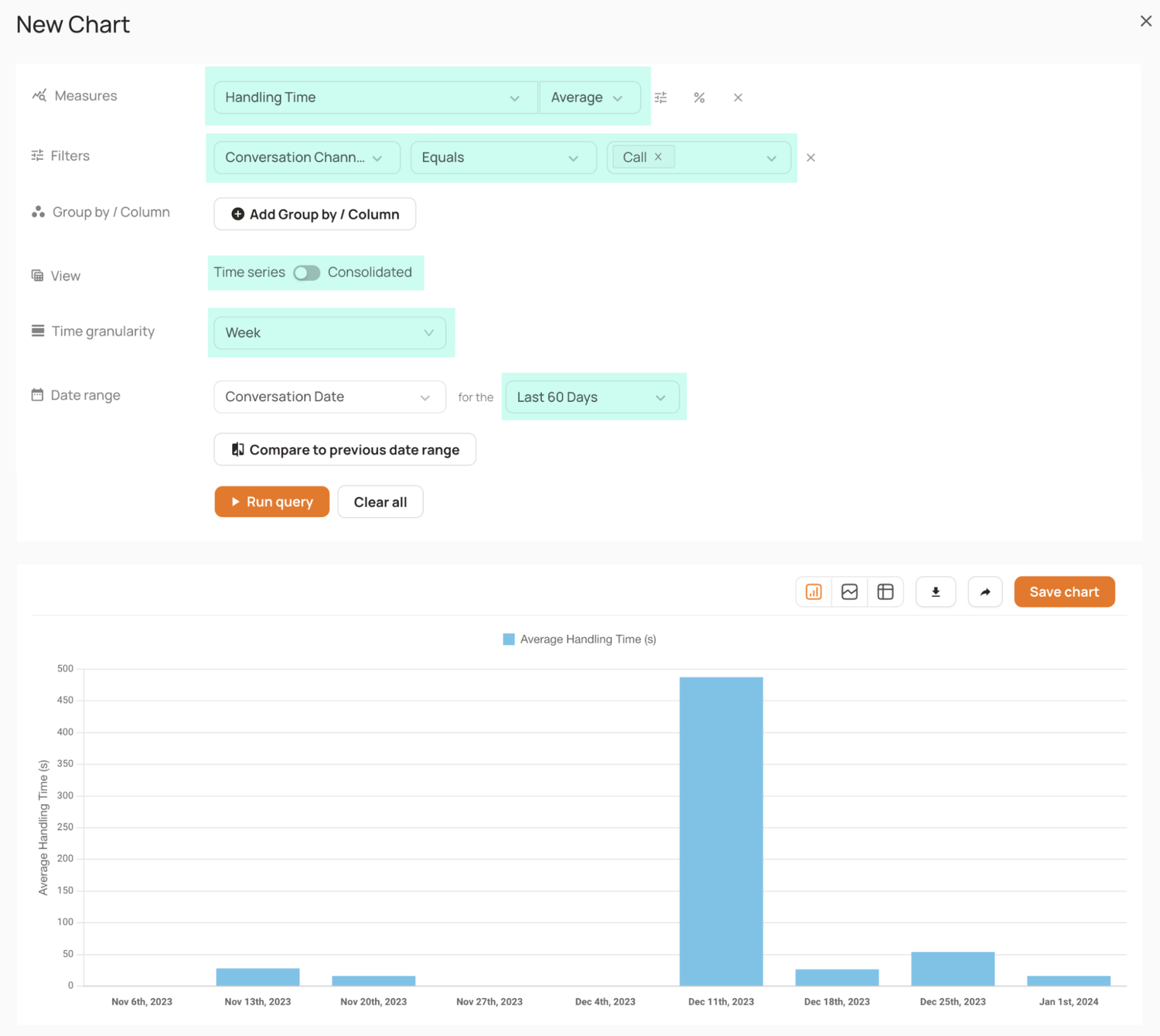
Augment Customer Service using Level AI
Level AI saves you time and effort thanks to its ability to understand word meanings and contexts with near-human accuracy, letting your agents, managers, and QA staff accomplish more.
Book a call with Level AI today to learn how our platform can support your organization to improve your customer service.
Observe.AI: Voice AI Chatbots to Support Call Center Teams
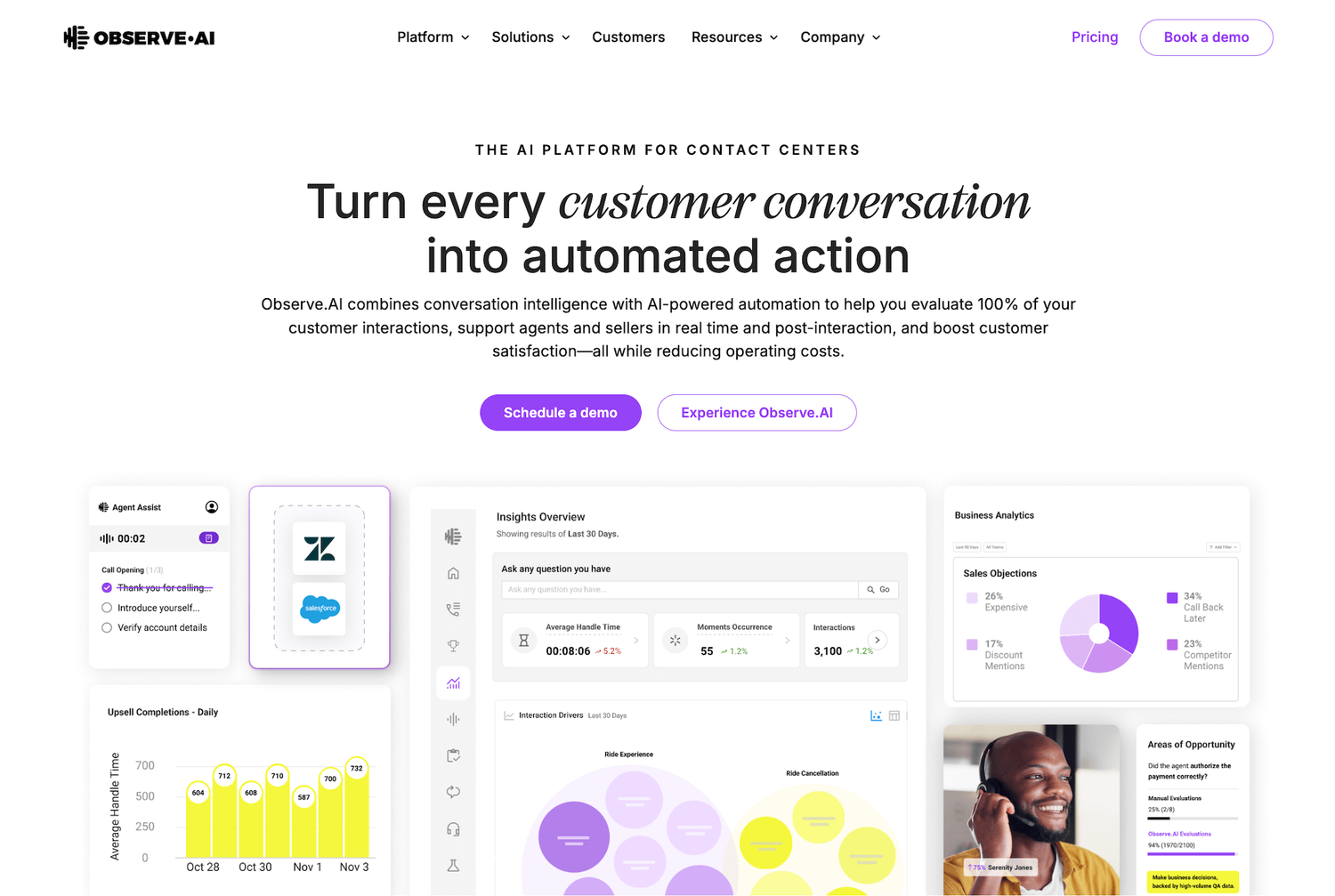
In addition to offering AI for post-call summarization, reporting, and analytics, and to support agents through live coaching and guidance, Observe.AI offers voice AI chatbots for frontline support.
Observe.AI lists banking and financial services, insurance, and healthcare as the primary industries served and helps maintain compliance and improve customer experience.
No pricing information is available on the website.
Cresta: Unified Platform for Human and AI Agents
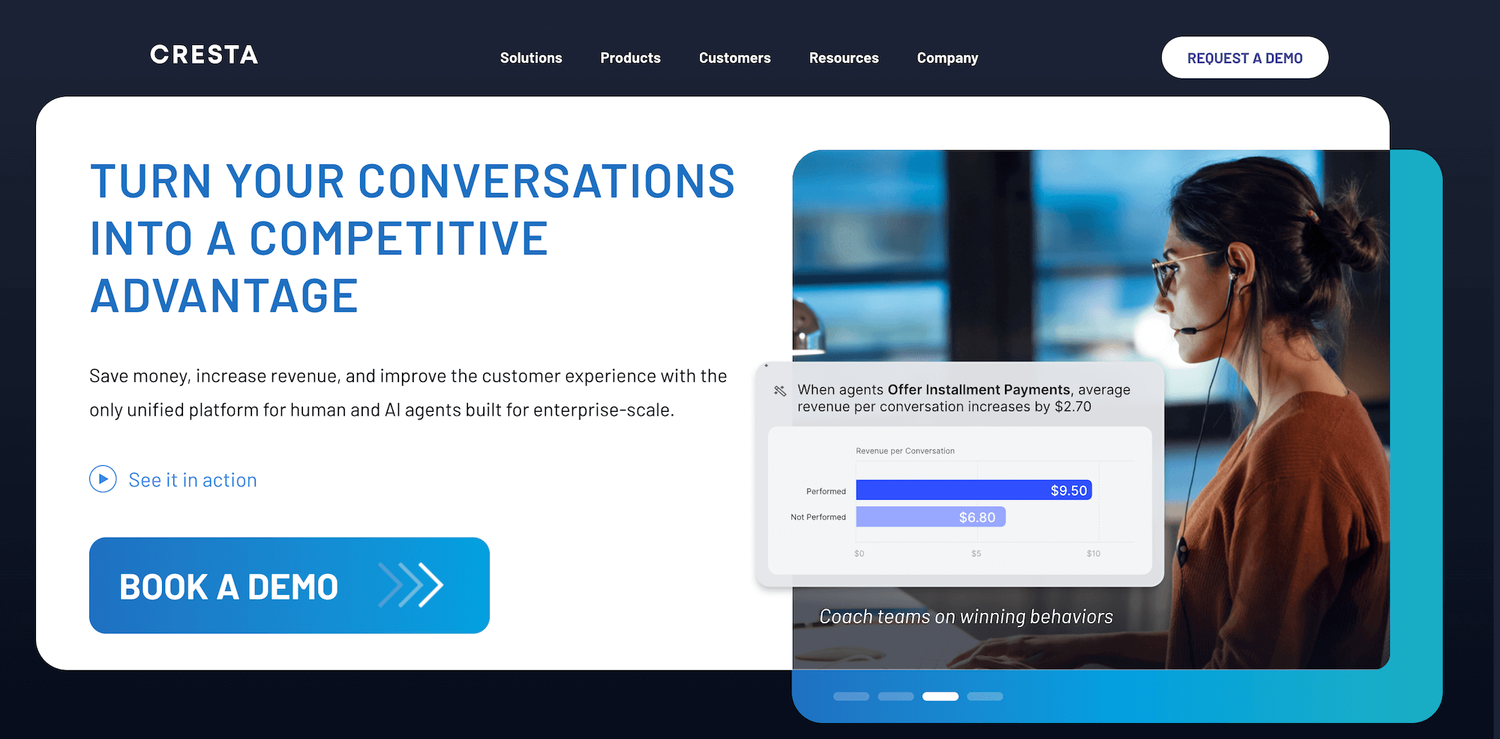
Cresta is another conversational AI platform for support centers that offer AI-based live and post-call agent support, analytics, and quality management for customer service interactions.
In addition to customer support, Cresta can be used for sales, retention, and collections. The industries it serves include airlines, automotive, insurance, retail, finance, and telecommunications, plus travel and hospitality.
No pricing information is shown on the website at the time of writing.
AI Tools for HelpDesks
Help Scout: Generative AI for Self-Service and Agent Support
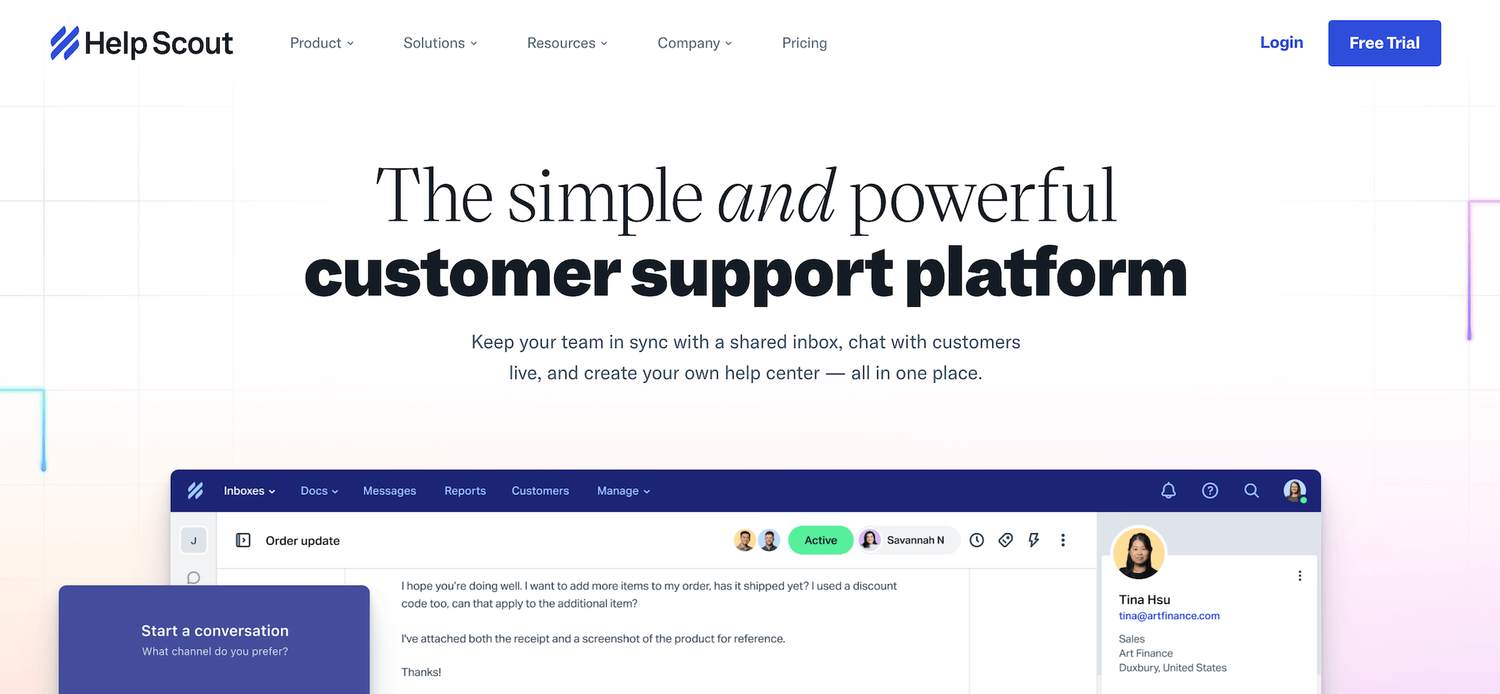
This customer service software platform incorporates an omnichannel ticketing system, a chatbot, and knowledge base support. Help Scout uses AI customer service tools to offer self-service based on KB content, and to help agents draft, summarize, and translate their response to streamline customer service operations.
It also offers a proactive messaging capability for announcement workflows, product onboarding, and upsells. The industries Help Scout serves include SaaS, e-commerce, financial services plus manufacturing, logistics, real estate and more.
Plans start at $50 per month (annually), with a free plan available.
Freshdesk: AI Agents and Copilot to Streamline Ticket Responses
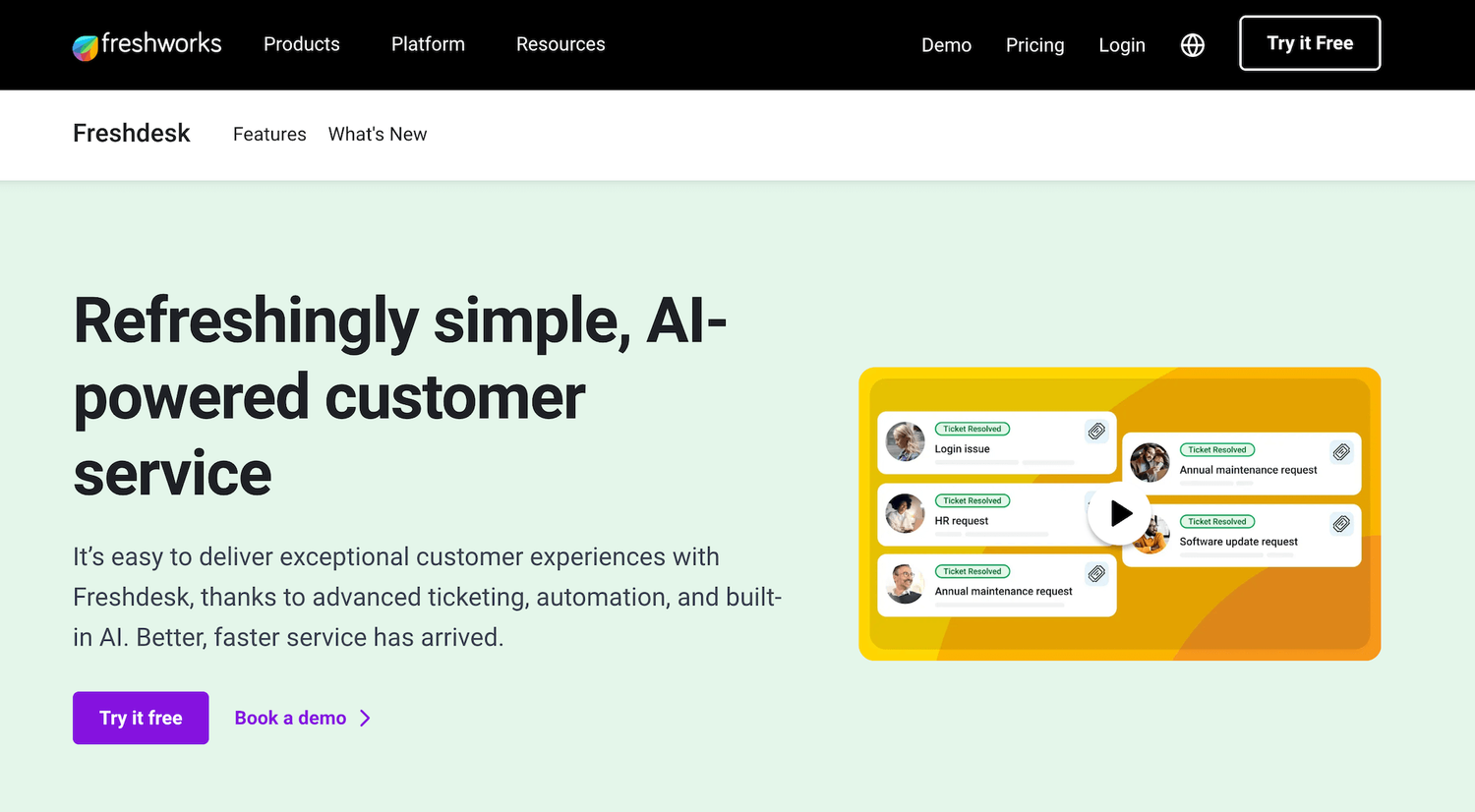
This helpdesk platform doesn’t offer AI solutions on every plan, but on higher-tier plans, customers can use AI assistants like Freddy AI to autonomously resolve customer queries, analyze customer data and customer support center data, and provide recommendations.
It can also help streamline support processes through prioritizing support tickets and providing faster responses based on AI copilot drafts. Plus, it offers access to an AI assistant to generate custom reports, dashboards, and answer questions about available analytics data.
Plans start at $15 per agent per month, billed annually. Free plans are available.
AI Tools to Assist Agents
Sprinklr: Agent Augmentation and Digital Twins
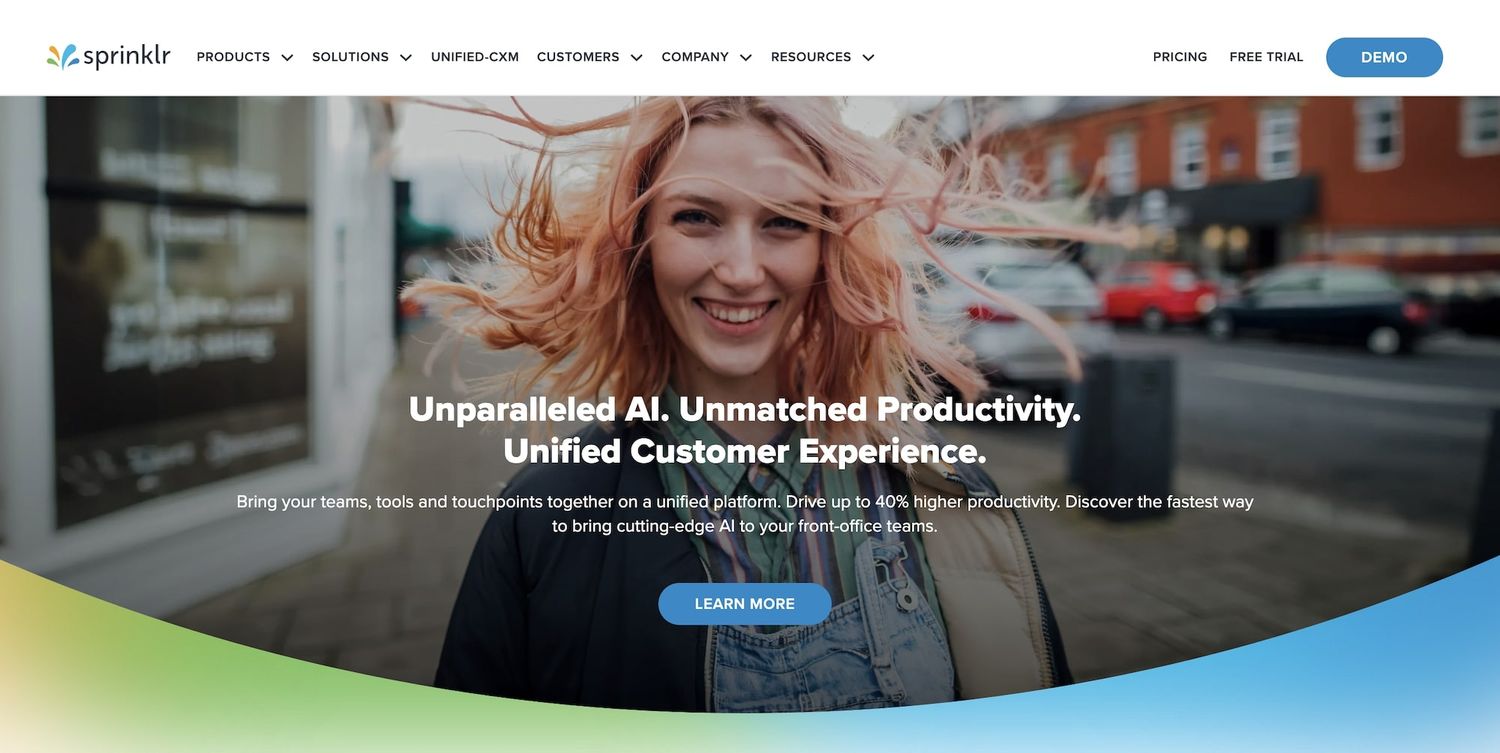
In addition to integrating AI tools that support agents, such as using a chatbot, adding suggestions to help agents reduce time to resolution, and quality management support, Sprinklr offers “digital twins.”
These artificial intelligence versions of your employees are able to autonomously provide AI customer service, resolving both routine tasks and complex issues.
Sprinklr also supports features and AI tools for marketing teams, such as social media publishing and engagement, social advertising and ad comment moderation, as well as content marketing and campaign planning.
Plans start at $299 per year per month when billed annually for customer service features and $199 for social media only features.
Aivo: Faster Ticket Resolution Through Integrations with Financial Data Sources

In addition to providing ticketing and chat support for simpler customer issues, Aivo AI can provide instant responses for issues that incorporate transactions and confidential information to improve customer service experiences.
Aivo lists telecommunications, banking, and commerce as industries that they serve. In addition to chatbots, Aivo supports customer needs via WhatsApp campaign creation, knowledge microsites, and omnichannel AI copilot support for agents.
No pricing information is available on the website.
AI Tools with Advanced CRM Integrations
Kustomer: Proactive AI-powered Outreach
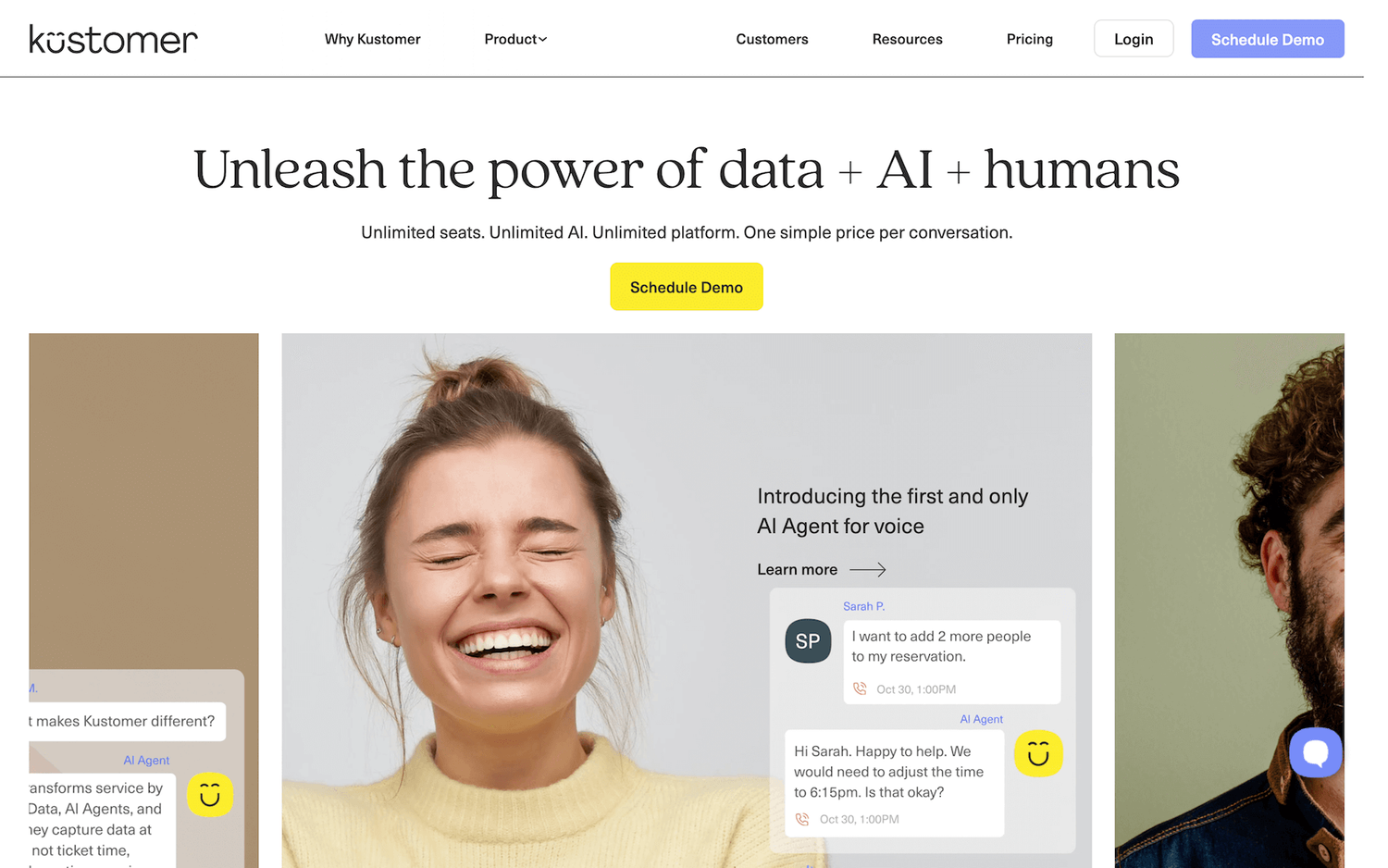
While other ticketing solutions also have integrations with CRM platforms, Kustomer uses CRM data to also send out proactive customer service announcements that help improve loyalty and customer relationships overall.
It also offers AI-powered agent support as well as customer-facing chatbots to answer customer queries or redirect customer questions to human agents.
Plans start at $89 per user per month, with a price per conversation model available as an option.
Salesforce Service: AI integration between CRM and Salesforce
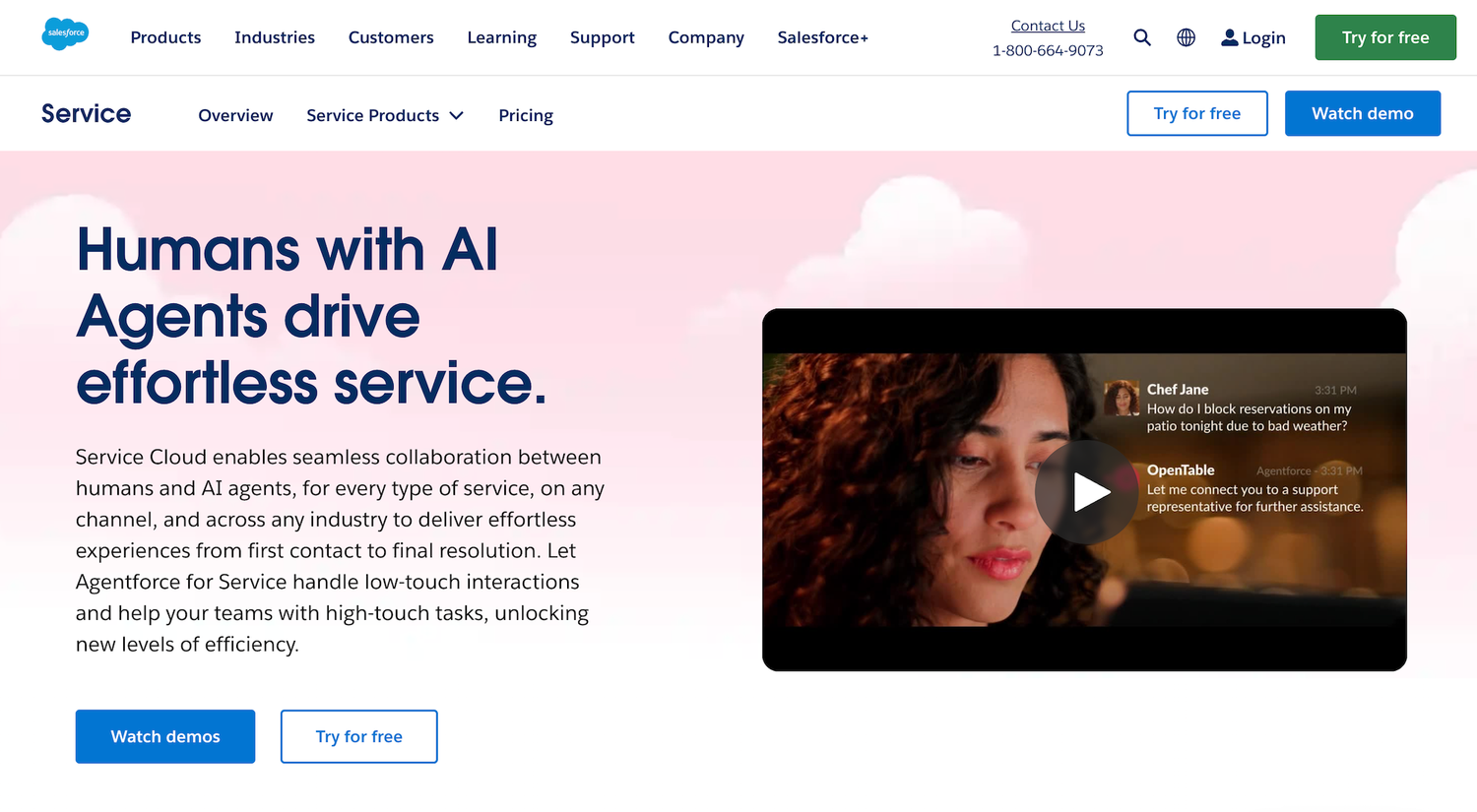
Salesforce Service makes it easier for customer support teams to provide personalized support and decrease response times with answers that are based on CRM data through conversational messaging. It also offers a handoff option to transfer more complex questions to human agents.
In addition to traditional customer service teams, Salesforce Service can be used by Field Service agents, such as help dispatchers and technicians.
Starting price for plans is $25 per user per month, not including add-ons or apps.
Get Started with Level AI
Level AI supports call center teams by making it easier to train agents, assess their performance, and support them during customer support calls, leading to higher customer satisfaction, lower resolution times, and more consistent replies.
Book a call with Level AI today to learn how we can improve your performance.
Keep reading
View all

